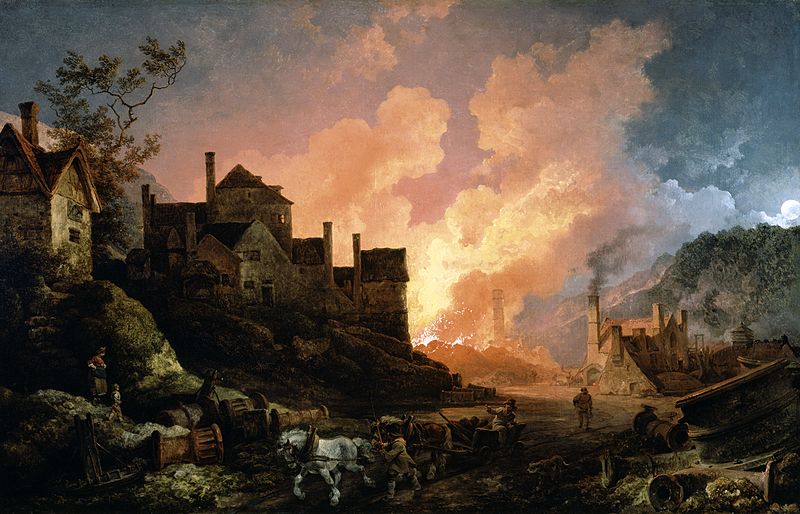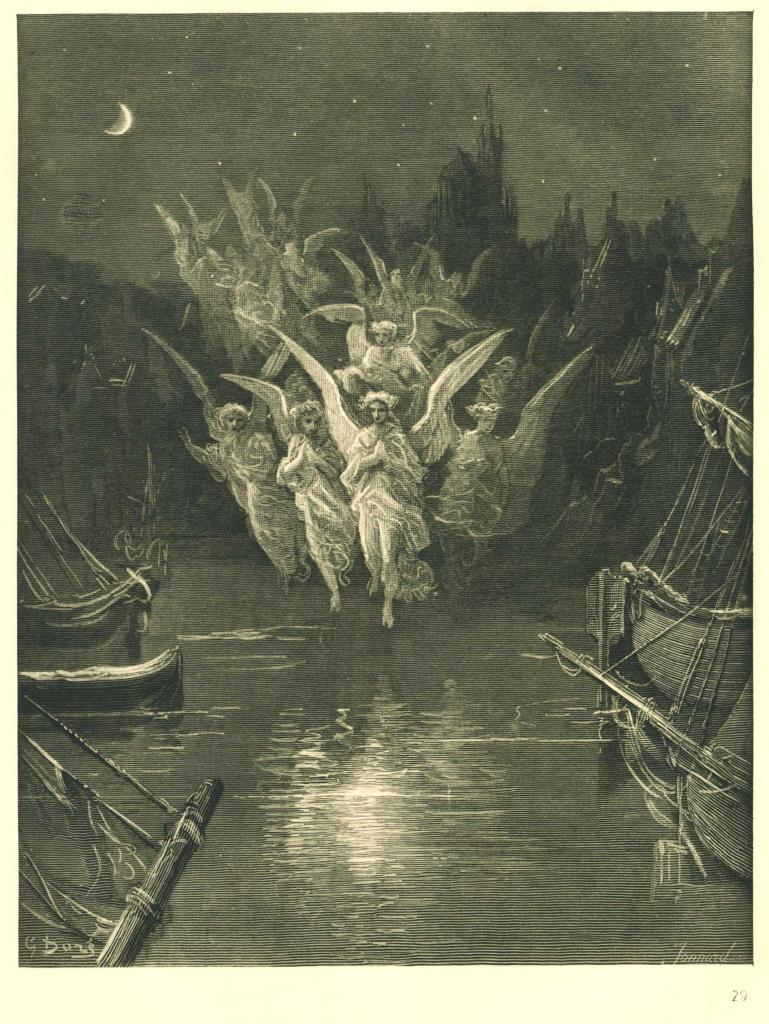David Russell Mosley

Philip James de Loutherbourg (1740–1812)
Title Coalbrookdale by Night
Description
depicted place: Madeley Wood Furnaces, Coalbrookdale
Date 1801
(Public Domain)
Ordinary Time
27 September 2016
The Edge of Elfland
Hudson, New Hampshire
Dear Readers,
The other day I came across a video from The Guardian concerning Donald Trump. The video is called “Trump, trade and racism: economic decay is dividing Ohio Democrats.” According to the video most of the working class people, or at least the union members among them, in Youngstown, OH were, for years, Democratic voters. Now, however, in light of the Trump campaign, many of them have switched over to the Republican Party in order to vote for Donald Trump. The video emphasizes an important point: nearly, if not all, the people who switched from the Democratic Party to the Republican are white. A Trump campaign manager in OH even went so far as to say that there was no racism in America prior to the Obama administration. She has since resigned and the video does an excellent job of highlighting the racial tensions and disparities that have been so indicative of this campaign (over picking which white person to vote for) than there has perhaps been in any other campaign in recent memory.
That being the case, and having addressed in my own small way the issues of race in a previous letter, today I want to focus on the other aspect of this video, namely the idea that working class people will benefit from either a Trump or a Clinton presidency. Rather than pick apart the campaigns or stated policies of either candidate, I want to do something that feels much more novel, even though it shouldn’t be. I want to return to the founding document of modern Catholic Social Teaching, Pope Leo XIII’x papal encyclical Rerum Novarum which was written on May 15, 1891.
There are many things which the Pope presents that are worthy of consideration. Chief among them is the good of private property. Some might try to use this emphasis to support the rich gathering up all the property they can afford. But the Pope’s emphasis is not so much on the ownership of property as such, though he does address this, but the owning of property by the working classes:
“It is surely undeniable that, when a man engages in remunerative labor, the impelling reason and motive of his work is to obtain property, and thereafter to hold it as his very own. If one man hires out to another his strength or skill, he does so for the purpose of receiving in return what is necessary for the satisfaction of his needs; he therefore expressly intends to acquire a right full and real, not only to the remuneration, but also to the disposal of such remuneration, just as he pleases. Thus, if he lives sparingly, saves money, and for greater security, invests his savings in land, the land, in such case, is only his wages under another form; and consequently, a working man’s little estate thus purchased should be as completely at his full disposal as are the wages he receives for his labor.”1
It is clear even from just this passage that the Pope’s emphasis is not on the rich gathering more wealth and property for themselves, but for the working man (and woman) to be able to gain property for themselves. Specifically, to gain enough that it can be passed on to future generations2 and that it, alongside the laborer’s wages is enough to support the laborer and his family.
This is, admittedly, quite akin to Bernie Sanders’s appeal that no one who works 40 hours a week should require government assistance to live. Of course the potential problem with Sanders’s assertion is that it did not, at least as I understood it, take enough account of the family. An individual living on her own might be able to make enough money to support herself but not, necessarily a family as well. But Pope Leo says this is not right:
“That right to property, therefore, which has been proved to belong naturally to individual persons, must in like wise belong to a man in his capacity of head of a family; nay, that right is all the stronger in proportion as the human person receives a wider extension in the family group. It is a most sacred law of nature that a father should provide food and all necessaries for those whom he has begotten; and, similarly, it is natural that he should wish that his children, who carry on, so to speak, and continue his personality, should be by him provided with all that is needful to enable them to keep themselves decently from want and misery amid the uncertainties of this mortal life.”3
If we set aside, for a moment, that the Pope was writing in a time where men were the primary ones leaving the home to earn wages, it is obvious that the Pope believed that an individual ought to be able to earn enough money to support a spouse and a family, allowing at least one parent to remain in the home with children, not because that spouse is incapable of anything else, but because it is a good that children be with family as much as possible. I have friends who believe that any work which takes a parent away from their children for any period of time is ultimately evil, that work and home ought to go hand-in-hand. The Pope does not, necessarily disagree with this, but writes in a time when it was common for at least one adult member of a household to have to leave the house in order to earn money to support their families.
In any event, the Pope is clear that the worker must be treated fairly and in such a way as they can support their families and obtain, if at all possible, land on which to live. For the Pope, “to misuse men as though they were things in the pursuit of gain, or to value them solely for their physical powers – that is truly shameful and inhuman.”4 There must be a right relationship between the worker and the employer, where neither seeks to harm the other but to work for their mutual betterment. The Pope was writing at the height of industrial revolution which also saw the rise of disparity between workers and employers. Already, as so often happens in societies, the richer were getting richer and the poor, poorer. The Pope thus encourages societies to move to such a practice that would, in actual fact, begin to breakdown the very nature of worker and employer by encouraging the worker to buy land in order to work it for himself:
‘”If working people can be encouraged to look forward to obtaining a share in the land, the consequence will be that the gulf between vast wealth and sheer poverty will be bridged over, and the respective classes will be brought nearer to one another. A further consequence will result in the great abundance of the fruits of the earth. Men always work harder and more readily when they work on that which belongs to them; nay, they learn to love the very soil that yields in response to the labor of their hands, not only food to eat, but an abundance of good things for themselves and those that are dear to them. That such a spirit of willing labor would add to the produce of the earth and to the wealth of the community is self evident. And a third advantage would spring from this: men would cling to the country in which they were born, for no one would exchange his country for a foreign land if his own afforded him the means of living a decent and happy life.”5
So why do I write this, ultimately brief, presentation on Pope Leo XIII’s famous social encyclical? What bearing does this have on our lives today? If Pope Leo is right even in just parts of his understanding of the nature of work, money, and property then we ought to begin to see something rather obvious. Neither candidate being presented to us is ultimately going to aid us in bringing about this kind of change to our society. Clinton and Trump are ultimately cut from the same cloth. Clinton may speak to some of the laborers in this country as promising to be their friend, but she does not understand their plight. Trump too, it is obvious, speaks to a large working class demographic trading on rather natural feelings about the nature of our present political corruption and love (even if often inordinate) of our country. But neither can do what we need. The Pope makes it clear that only Christian institutions can ultimately bring about the kinds of change we need. This is not to say that we should bury our heads in the sand or retreat from public life and let the rest of the world go to pot. Rather it means that we need to engage, first in our families, then in our local communities, then in our states, and lastly (and in many ways, I think, least importantly) at the federal level. We need to engage with the love of Christ at each of these levels letting them not only guide how we vote but how we actively participate in changing this society for the better. So remember that not as you go to the polls in November, but as you go about your daily lives from this very moment onward.
Sincerely,
David
1 Pope Leo XIII,Rerum novarum [Encyclical on Capital and Labor], Vatican Website, May 15 1891, 5, accessed 14 May 2015, http://w2.vatican.va/content/leo-xiii/en/encyclicals/documents/hf_l-xiii_enc_15051891_rerum-novarum.html.
2 Pope Leo XIII,Rerum novarum [Encyclical on Capital and Labor], Vatican Website, May 15 1891, 6, accessed 14 May 2015, http://w2.vatican.va/content/leo-xiii/en/encyclicals/documents/hf_l-xiii_enc_15051891_rerum-novarum.html.
3 Pope Leo XIII,Rerum novarum [Encyclical on Capital and Labor], Vatican Website, May 15 1891, 13, accessed 14 May 2015, http://w2.vatican.va/content/leo-xiii/en/encyclicals/documents/hf_l-xiii_enc_15051891_rerum-novarum.html.
4 Pope Leo XIII,Rerum novarum [Encyclical on Capital and Labor], Vatican Website, May 15 1891, 20, accessed 14 May 2015, http://w2.vatican.va/content/leo-xiii/en/encyclicals/documents/hf_l-xiii_enc_15051891_rerum-novarum.html.
5 Pope Leo XIII,Rerum novarum [Encyclical on Capital and Labor], Vatican Website, May 15 1891, 47, accessed 14 May 2015, http://w2.vatican.va/content/leo-xiii/en/encyclicals/documents/hf_l-xiii_enc_15051891_rerum-novarum.html.












